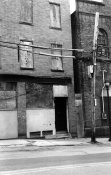Martin watched the phone ring. The sound resembled some annoying cricket. It wouldn't stop.
"'Lo?"
"They won't take messages? That's a novel approach." He recognized the midwestern voice of the woman he'd met at his sister's station.
"Um, paper policy. Doesn't tie up switchboard personnel scribbling it down. Another idea being, if it can't wait, someone available can do the story?"
"Well, okey-doke. Listen. I think I need a translator. I've never worked south of Kentucky before, but it's a little strange to ask for something and hear, 'Well I'll hunt you one down.'"
"Does lean a little to the extreme."
"And, appreciate 'cha! I thought it was a plug for some unpronounceable sort of tea."
"How about sure don't—as if asking for something required a specialized affirmative case of the negative?"
"Guess it's just a matter of time until I come across that one. Listen, I'm calling—do you go to movies? Wait. That's not a question. I think what I mean is this specific movie, have you seen it already?"
Martin couldn't remember being asked out. Not in a current lifetime. Not that he minded, per se. But if his sister had something to do with prodding this motion. . .
On the way to the restaurant they had that feeling, that blooming silence between that grew oppressive from not saying anything, growing more oppressive when something was said.
He was driving down DeSiard, getting caught at every light, making slow progress.
"It would have been faster going to Forsythe and Riverside to Grand." Spoken with the authority of a recent bout with maps.
"Yes, it would have taken about seven and one half minutes depending on the variables."
"And yet you choose to go through this part of town." Presumably meaning: half-demolished buildings, overflowing trash receptacles, hand-painted storefront signs, obscure piles of bricks, scabs of floor tiling clinging to concrete slabs. Oblique signs of human habitation.
"We might see something. A scene. A clue."
"I'm off duty.Thought you were too."
"Human life. Teeming with incident. Out there for us to uncover and observe. Report to the people."
"This venue does have something of the air of a bygone era, doesn't it? The old main east to west artery of the South. The sun-drenched pregnant-with-violence South. In moments you get a snatch of glory it used to possess?"
"No. It's what it is now. The beauty of bombed-out mysteries. The hollows in the walls."
"Love in the ruins."
"No. Not even that. The absence of everything that fills. Rather, the contrite beauty of there being only what is."
"Wait. Didn't we pass the Coney Isle two seconds ago? The one your sister said you worsh-- hung out at."
"We did."
"So, what's this?"
Stopped at a red light, no other cars in sight, except abandoned ones.
"What's what?"
"Isn't this it? Right over here? "
"No, this is not it."
"And so, there's another one, just like it?"
"This one's nothing like ours. Look. See?" Martin points in the door. "The counter seats face west."
"So, you ever go in this Coney Isle?"
"No. None of us do."
"Your light is green."
"I know that. Doesn't help to have it pointed out."
"Oh. Sorry." Geniune, puzzled.
They came to the end of DeSiard, bisected by Grand. Straight ahead, the river and the old iron bridge, its overnarrow image informed by rusting supports such as to induce agoraphobic breathing.
The restaurant they sought occupied a corner position. Martin slid into a parallel parking spot in front of the building, a high angled ediface he explained began its life as a telegraph office in another century.
The interior was jazzy, polished, a hyperreal evocation of some gilded age interior. They were seated at a very small round table with round stools directly by the ceiling-to-floor window which was only inches from the sidewalk.
Suddenly a bicycle careened around the corner, glanced off a faux-reconstruction light pole and spilled its rider into the street. A passing car lightly tapped the handle bar, did not stop for the vagrant-like rider, who leapt up and stomped his feet and yelled not-so-veiled imprecations before shakily remounting.
"See?" Martin said. "What did I tell you?"
"I've noticed already this is a hallmark of yours, the tendency to refer something as evidence to an earlier point or argument you were making, yet the transition is not there. There's this huge gap."
"I rest my case."
"Okey-Doke. Back to this other Coney Isle, two blocks down from yours. Are you serious that you've never gone in there?"
"What other Coney Isle?"



